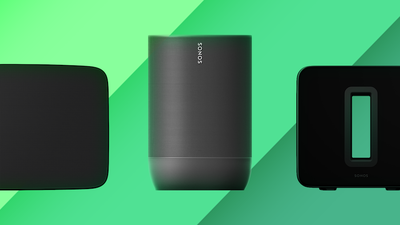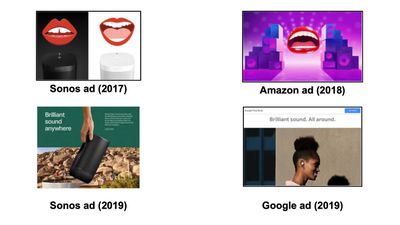Sonos is today participating in an antitrust hearing on the smart home, where Sonos legal chief Eddie Lazarus had some commentary to share on the smart home market and the dominance of companies like Amazon, Google, and Apple.

Headed up by Amy Klobuchar, the Subcommittee on Competition Policy, Antitrust, and Consumer Rights is today hosting a hearing on "Protecting Competition and Innovation in Home Technologies." Most of Sonos' complaints relayed by Lazarus are focused on Amazon and Google, but he did have a few comments about Apple.
In particular, Sonos has taken issue with the way that Apple is implementing Siri support for third-party companies. Apple at WWDC announced that third-party companies are able to integrate Siri voice control into their HomeKit devices, but "Hey Siri" commands are relayed through a HomePod or HomePod mini, making an Apple device a requirement.
Take Apple's announcement that it will now license Siri to third parties in the smart home. As reported in The Verge, Apple will only license Siri to companies that utilize the HomePod as a central hub to connect with Siri Thus, Apple is conditioning interoperability with Siri on companies placing a competitive Apple product alongside their own.
Lazarus also said that while Google, Apple, and other companies are working on interoperability through initiatives like Matter, he's skeptical that this will lead to consumer choice or foster genuine interoperability between different smart home platforms. He also warns that because Apple and Google control the standard, they have control over the "pace of innovation."
No doubt the dominant companies will suggest that new legislation is unnecessary in light of the initiatives they have underway -- like the "Matter" alliance -- that are working towards a degree of smart home standardization to facilitate interoperability. It may well be that these efforts will yield some positive results for the makers of back-end devices, such as light bulbs, garage door openers, and the like by enabling them to interoperate with any of the three major ecosystems (Alexa, Assistant, Siri) using a uniform code base. But count me a skeptic that these types of initiatives will foster consumer choice at the front-end -- where consumers control their smart home devices -- or do much, if anything, to foster genuine interoperability across the siloed ecosystems of gatekeepers. From the user's perspective, the choices among a very few walled gardens will likely remain the same. One could imagine, furthermore, a Trojan Horse aspect to all this. Those who control the standard and its evolution effectively control the nature and pace of innovation, including the innovations dreamed up by their competitors. The standard Matter is working on, as I understand it, is basically a creature of Google and Apple code. That is hardly a formula for fair competition or more creative invention. It's a formula for further entrenching the dominance of the very few.
Because Amazon and Google dominate the smart speaker market, most of what Lazarus had to say focused on those two companies. He complained that as a condition of allowing Google Assistant on Sonos speakers, Sonos had to agree to allow just one voice assistant at a time, even though it supports multiple.
But Google demanded as a condition of having Google Assistant in our products that we never allow concurrency with another general voice assistant. As a result, today Sonos customers must open an application and manually choose which single voice assistant will be configured on their device. This forced choice degrades the consumer experience, but it is arguably good for Google, which is betting that most users will choose Google Assistant as the default voice assistant and then stick to the Google ecosystem.
He said that Google and Amazon have a history of taking on competitors by producing copycat products sold at subsidized prices, which is something that Sonos and other smart speaker companies aren't able to compete with.
Amazon and Google have now come to control roughly 85% of the U.S. smart speaker market. This is terrible for innovative dynamics because it hamstrings those companies that have better products that cannot be sold at a loss and consumers lose. In addition to protecting the future profits of their dominant products and services, cross-subsidization ultimately will result in the same anticompetitive effects as "traditional" below-cost predatory pricing; prices are sure to go up once these dominant companies have driven the other companies out of the market and reduced competition.
Google and Amazon have also allegedly copied Sonos advertising initiatives to confuse consumers.

If things don't change, Lazarus warns that in the future, every smart home will be controlled by a few dominant companies.
We see two possible futures for the smart home. In the first scenario -- resulting from the current trajectory we're on -- every smart home will be controlled by one of a few dominant companies, Google, Amazon, or perhaps Apple or Facebook will squeeze in too. These behemoths will exert overwhelming control over the direction of innovation and what new ideas make it to market, ultimately replicating a market structure that history tells us inhibits innovation and competition. Consumer choice will also wither. Consumers will find themselves channeled into the siloed ecosystems of a Google or an Amazon in a self-reinforcing dynamic of network fueled dominance.
With revamped antitrust law and enforcement level, the U.S. government could "broaden the playing field," according to Lazarus, allowing Sonos and other companies to "innovate and bring novel experiences to customers," with multiple companies competing based on product and services merit.







 ('https://www.macrumors.com/2021/06/15/sonos-apple-homepod-siri-antitrust-complaints/')
('https://www.macrumors.com/2021/06/15/sonos-apple-homepod-siri-antitrust-complaints/')












